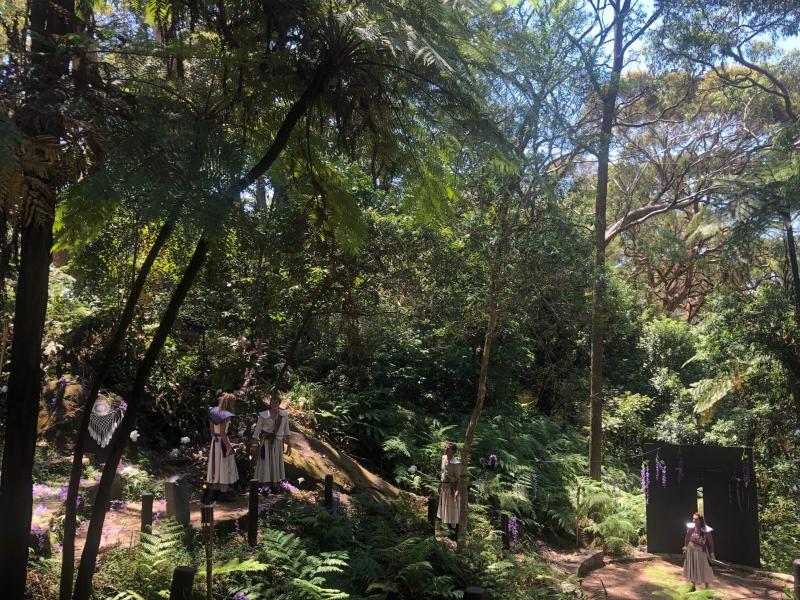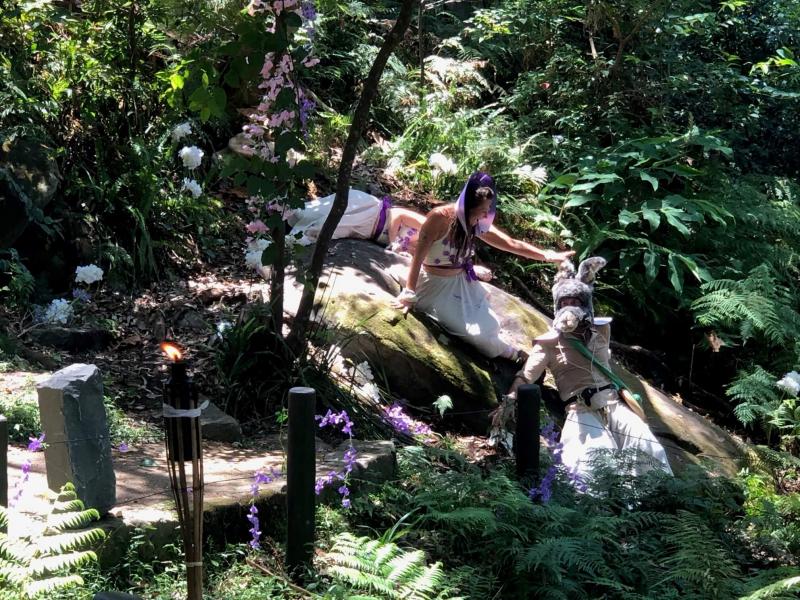A Midsummer Night's Dream - Come You Spirits
Australia boasts a range of outdoor Shakespeare theatre (for more, see Rosemary Gaby’s excellent book), but there is something a little different about Come You Spirits’ outdoor production of A Midsummer Night’s Dream.
This new theatre company focuses on the use of ‘Chi energy’. The productions are, as stated by the company, about an exchange of energy just as much as they are interested in an exploration of Shakespeare’s drama. With a running time of 90 minutes and a small cast, each production is pared down. The company writes that: ‘We simplify the plot and amplify the natural magic’ (Come You Spirits website).
And there is certainly something magical about their A Midsummer Night’s Dream in the Haven amphitheatre in Castlecrag. We attended an 11am production on Sunday 15 January. Despite the midday heat and clear sky, settling ourselves under the leafy canopy beneath kookaburras and noisy myna birds was pleasant and relaxing. This is not a traditional modern theatrical experience – spectators are encouraged to move as needed, to picnic, and indeed as the production develops, the audience benefits from moving a little to capture the dynamic action. One might argue for some resonance here with early modern modes of theatregoing (to some extent). And in the same vein, the production has no director with all actors working 'as equals' (Program Notes).

The cast of Come You Spirits’ Midsummers comprises only four actors (Jo Bloom, Sontaan Hopson, Charles Mayer, Ciáran O'Riordan) plus a sound artist (Brandon Read) who responds in real time to the actors. This means a significant condensing of the plot and characters: the actors double up as the four Athenian lovers (Hermia, Helena, Lysander and Demetrius) and four fairies (Puck, Titania, Oberon and Peaseblossom). Theseus, Hippolya and Egeus are omitted. The lovers, not the mechanicals, are the ones putting on the play-within-a-play, Pyramus and Thisbe. To transition from character to character, the production uses a kind of possession – with Lysander transforming visibly into Puck and vice versa, so that Puck (Ciáran O'Riordan) places the love potion on his own eyes while he possesses Lysander’s body.
While for newcomers to the play, this might cause some confusion, the point of this production is not a clear conveyance of the play’s plot – there are deeper aims at work here. The logic of the play is subsumed beneath an exploration of certain dynamics operating in space – for example, the infamous lovers’ quarrel of Act Three, scene two, is staged with few cuts, enabling the four characters to traverse the space with breathtaking energy and movement. The small flat circular amphitheatre space itself is only used minimally, with the characters energetically moving through the flora, across the stones and steep steps, creating engaging action and plenty of hilarity. The use of the space was outstanding, especially in moments like the production of Pyramus and Thisbe, when ‘Wall’ becomes a hastily assembled and very unstable pile of rocks that Pyramus tries to keep steady.

While the play is framed with a discussion of the company’s ethos, the use of energy in the production itself is integrated subtly. Puck at one stage holds a silver ball, a gong is used repeatedly, a singing bowl features in Titania’s lullaby. In the standoff between Titania and Oberon (2.1), the characters hurl not only words but, it seems, magic, across the space of the amphitheatre with beautifully precise choreography. At the conclusion of the play, spectators are invited to join the cast in a short meditation led by Jo Bloom. This inclusion was thoughtful and a fascinating way to reflect on that moment of liminality in theatre as the play dissolves and the audience must return to their real lives. The meditation asked us to linger in that in-between state and to connect play, place and lived experience in a different way.
The four-person cast offered outstanding, versatile performances with precise physicality, crowd interaction, comic timing, chemistry, and use of space. Costuming, while minimal, was highly effective with simple changes reinforcing character changes. The use of sound grew especially effective towards the latter part of the play.
Come You Spirits demonstrate incredible versatility in moving productions across different spaces. Across 2022 and 2023, that included a ship (for The Tempest), an inner Sydney bar (for Macbeth), and outdoor locations including Cooper Park in Woollahra and the Haven amphitheatre in Castlecrag. Not only do they move deftly across spaces, but they also rotate four plays: Romeo and Juliet, Macbeth, A Midsummer Night’s Dream and The Tempest.
Come You Spirits is touring Byron Bay from 24-29 January 2023.
